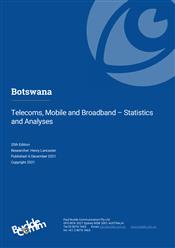Botswana Telecoms Market Report
Telecoms, Mobile and Broadband - Statistics and Analyses

Botswana’s national network continues to increase in scale
Effective regulatory reform has made Botswana’s telecom market one of the most liberalised in the region. There is a service-neutral licensing regime adapted to the convergence of technologies and services, and several operators now compete in all telecom sectors.
Botswana has one of the highest mobile penetration rates in Africa, though with this growth in the number of subscribers has slowed sharply in recent years. The popular use of multiple SIM cards from different operators convinced that regulator that there was no need introduce mobile number portability, and although the government pursued the idea for some years, it accepted in April 2021 that it would not be implemented after all.
In a bid to generate new revenue streams and secure market share, the three MNOs – Mascom Wireless (an affiliate of South Africa’s MTN), Orange Botswana (backed by Orange Group) and BTC – have entered the underdeveloped broadband sector by adopting of 3G, LTE, and WiMAX technologies. In the fixed-line broadband market they compete with a large number of ISPs, some of which have rolled out their own wireless access infrastructure.
The landlocked country depends on satellites for international bandwidth, and on other countries for transit capacity to the landing points of international submarine cables. The landing of additional cables in the region in recent years has improved the competitive situation in this sector, while prices for connectivity have fallen dramatically. Paratus Teleco in mid-2021 completed the first stage of a private network covering the entire country, and linking to the company’s international cables.
BuddeComm notes that the outbreak of the pandemic continues to have a significant impact on production and supply chains globally. The telecoms sector to various degrees is likely to experience a downturn in mobile device production, while it may also be difficult for network operators to manage workflows when maintaining and upgrading existing infrastructure.
Overall progress towards 5G may be postponed or slowed down in some countries.
On the consumer side, spending on telecoms services and devices is under pressure from the financial effect of large-scale job losses and the consequent restriction on disposable incomes. However, the crucial nature of telecom services, both for general communication as well as a tool for home-working, will offset such pressures. In many markets the net effect should be a steady though reduced increased in subscriber growth.
Although it is challenging to predict and interpret the long-term impacts of the crisis as it develops, these have been acknowledged in the industry forecasts contained in this report.
The report also covers the responses of the telecom operators as well as government agencies and regulators as they react to the crisis to ensure that citizens can continue to make optimum use of telecom services. This can be reflected in subsidy schemes and the promotion of tele-health and tele-education, among other solutions.
Key developments:
- BTC improves satellite connectivity to improve rural broadband access and support e-learning and e-government services;
- Regulator tenders for a multi-spectrum mobile broadband licence;
- Government revises e-commerce strategy as part of the Vision 2036 program;
- Orange Botswana expands its Digital Schools Project, extends the reach of LTE-A services;
- Alphabet cancels Project Loon trials;
- Korea Telecom advises BTC on LTE network optimisation;
- Orange Money initiates cross-border m-payment platform;
- BTC reports 16% increase in net profit in fiscal 2021;
- Report update includes Statistics Botswana’s data to Q2 2021, telcos' data to Q3 2021, regulator's annual report updates and market data to Q1 2021, updated Telecom Maturity Index charts and analyses, assessment of the global impact of Covid-19 on the telecoms sector, recent market developments.
Companies mentioned in this report:
Botswana Telecommunications Corporation (BTC), Mascom Wireless (MTN), Orange Botswana (Vista Cellular), beMobile, Botsnet, MTN Business, InfoBotswana (IBIS), Broadband Botswana Internet (BBI), OPQ Net, Mega Internet, Global Broadband Solution (GBS), Tsagae Communications, Virtual Business Network Services (VBN), Bytes Technology, Fourth Dimension, Hi-Performance Systems, Microteck Enterprises, Tharinet, Netspread, First National Bank
Related Reports
- Africa - Mobile Infrastructure and Mobile Broadband
- Africa - Mobile Network Operators and MVNOs
- Africa - Fixed Broadband Market - Statistics and Analyses
- Niger - Telecoms, Mobile and Broadband - Statistics and Analyses
- Uganda - Telecoms, Mobile and Broadband - Statistics and Analyses
- Namibia - Telecoms, Mobile and Broadband - Statistics and Analyses
- Algeria - Telecoms, Mobile and Broadband - Statistics and Analyses
- Somalia - Telecoms, Mobile and Broadband - Statistics and Analyses
- Mauritius - Telecoms, Mobile and Broadband - Statistics and Analyses
- Mozambique - Telecoms, Mobile and Broadband - Statistics and Analyses
Share this Report
TMT Intelligence
A platform to scale your intelligence tasks
Monitor critical insights with our AI-powered Market Intelligence Platform gathering and analyzing intelligence in real time. With AI trained to spot emerging trends and detect new strategic opportunities, our clients use TMT Intelligence to accelerate their growth.
If you want to know more about it, please see:
Research Methodology
BuddeComm's strategic business reports contain a combination of both primary and secondary research statistics, analyses written by our senior analysts supported by a network of experts, industry contacts and researchers from around the world as well as our own scenario forecasts.
For more details, please see:
More than 4,000 customers from 140 countries utilise BuddeComm Research
Are you interested in BuddeComm's Custom Research Service?
Hot Topics
News & Views
Have the latest telecommunications industry news delivered to your inbox by subscribing to BuddeComm's weekly newsletter.